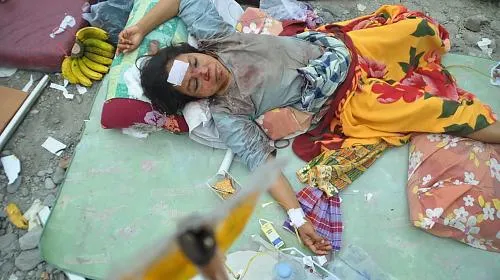JAKARTA (October 2, 2018) —The death toll from the earthquake and subsequent tsunami that struck the Indonesian island of Sulawesi grew to 1,234 today as rescuers fought to reach the worst-affected areas.
CARE will focus its planned response mainly in the Donggala area, north of Palu city – the more difficult area to reach, closest to the quake’s epicenter and the least likely to receive needed assistance.
“Our goal is to get to those survivors to provide life-saving drinking water, shelter and proper sanitation,” explained Helen Vanwel, CARE’s country director in Indonesia. “Still, access to these areas is severely limited. A landslide has blocked the main road into Palu, flights are restricted into the airport, there is a destruction of major seaports and a general lack of communication.”
Vanwel spoke to staff at a local NGO that CARE will partner with in the earthquake-affected area, who said it took them around 18 hours to reach the more remote area of Donggala and that they are the first, and so far, the only NGO to reach some of these communities. These staff members also report that while there aren’t huge amounts of damage to the buildings in the area, the biggest worry and tragedy are the numbers of people still lost out at sea who were swept away by the tsunami waves.
People in the area report that local government has come to a standstill, as officials are also among the victims, and they have not received any assistance since the earthquake happened.
CARE is sending members of its emergency response team to the affected areas as part of an interagency assessment.
CARE will also focus on the specific impacts on women and girls who are often disproportionately affected in natural disasters of this type and are at increased risk of many types of sexual and gender-based violence. Their voices are often also the least heard when it comes to emergency needs. In the first stage of the response, we will distribute kits targeted at women and girls that include sarongs and sanitary towels among other items.
Emergency family shelter kits including items such as such as tarpaulins sleeping mats, blankets and solar light, will be provided to those who have lost their homes to allow them to survive while the long process of rebuilding begins.
The government of Indonesia has estimated that some 65,000 homes have been damaged by the earthquake and tsunami in and around the populous city of Palu and Donggala district, with roads and sewage systems damaged and water supplies affected.
CARE has released funds in order to begin responding to the emergency and is seeking an additional US $5 million to help provide for the immediate needs of those affected.
CARE has offices in the south of Sulawesi island in Makassar, where it has been operating for nearly 30 years.
CARE has worked in Indonesia since 1967, initially focused on food distribution, small infrastructure projects, health, the environment, and water and sanitation. In 2004, CARE Indonesia was one of the primary emergency responders after the South Asian tsunami. Emergency response and disaster risk reduction with a focus on women and girls is always CARE Indonesia’s first priority. Its other core activities all focus on women and youth and include: Integrated Risk Management comprising resilience, food security and climate change; Economic Empowerment and leadership; and Water, Sanitation, and Hygiene.
About CARE:
Founded in 1945, CARE is a leading humanitarian organization fighting global poverty. CARE has more than seven decades of experience helping people prepare for disasters, providing lifesaving assistance when a crisis hits, and helping communities recover after the emergency has passed. CARE places special focus on women and children who are often disproportionately affected by disasters. Last year, CARE worked in 94 countries to reach 80 million people, including more than 11 million through emergency response and humanitarian aid.
To learn more, visit www.care.org.
Media Contacts:
Nicole Harris, 404-735-0871 nharris@care.org
Mahmoud Shabeeb, +962-79-146-39-03 mshabeeb@care.org (based in Amman, Jordan)

